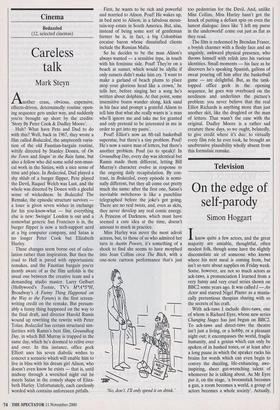Cinema
Bedazzled (12, selected cinemas)
Careless talk
Mark Steyn
Atother crass, obvious, expensive, effects-driven, determinedly routine open- ing sequence gets under way, and suddenly you're brought up short by the credits: `Story By Peter Cook & Dudley Moore'.
Huh? What have Pete and Dud to do with this? Well, back in 1967, they wrote a film called Bedazzled, the umpteenth varia- tion of the old Faustian-bargain routine, wittily directed by Stanley Donen, of On the Town and Singin' in the Rain fame, but also a fellow who did some solid non-musi- cal work in the Sixties, with a nice sense of time and place. In Bedazzled, Dud played a shy shlub of a burger flipper, Pete played the Devil, Raquel Welch was Lust, and the whole was directed by Donen with a gleeful sense of wickedness. In Bedazzled The Remake, the episodic structure survives a loser is given seven wishes in exchange for his you-know-what — but everything else is new: Swingin' London is out and a somewhat generic San Francisco is in, the burger flipper is now a tech-support nerd at a big computer company, and Satan is no longer Peter Cook but Elizabeth Hurley.
These changes seem borne out of calcu- lation rather than inspiration. But then the road to Hell is paved with opportunistic remakes, and the Faustian bargain you're mostly aware of as the film unfolds is the usual one between the creative team and a demanding studio master. Larry Gelbart (Hollywood's Tootsie, TV's M*A*S*H, Broadway's A Funny Thing. Happened on the Way to the Forum) is the first screen- writing credit on the remake. But presum- ably a funny thing happened on the way to the final draft, and director Harold Ramis wound up rewriting the rewrite with Peter Tolan. Bedazzled has certain structural sim- ilarities with Ramis's best film, Groundhog Day, in which Bill Murray is trapped in the same day, which he's doomed to relive over and over. In this instance, office geek Elliott uses his seven diabolic wishes to concoct a scenario which will enable him to live in bliss with his dream girl Alison, who doesn't even know he exists — that is, until midway through a wretched night out he meets Satan in the comely shape of Eliza- beth Hurley. Unfortunately, each carelessly worded wish contains unforeseen pitfalls. First, he wants to be rich and powerful and married to Alison. Pouf! He wakes up, in bed next to Alison, in a fabulous moun- tain-top estate in South America. But, alas, instead of being some sort of gentleman farmer he is, in fact, a big Colombian cocaine baron whose dissatisfied clients include the Russian Mafia.
So he decides to be the man Alison's always wanted — a sensitive type, in touch with his feminine side. Pouf! They're on a beach at sunset, which would be idyllic if only sunsets didn't make him cry. 'I want to make a garland of beach plums to place atop your glorious head like a crown,' he tells her, before singing her a song he's written about dolphins. At that point, some insensitive bozos wander along, kick sand in his face and prompt a grateful Alison to tell him that what she really wants is 'a man who'll ignore me and take me for granted and only pretend to be interested in me in order to get into my pants'.
Pouf! Elliot's now an 8ft-tall basketball superstar, but there's a tiny problem. Pouf! He's now a suave man of letters, but there's another problem. Pouf (so to speak)! In Groundhog Day, every day was identical but Ramis made them different, letting Bill Murray's character evolve in response to the ongoing daily recapitulation. By con- trast, in Bedazzled, every episode is nomi- nally different, but they all come out pretty much the same: after the first one, Satan's inevitable switcheroo is like a punchline telegraphed before the joke's got going. There are no real twists, and, even as skits, they never develop any real comic energy. A Princess of Darkness, which must have seemed a cute idea at the time, doesn't amount to much in practice.
Miss Hurley was never the most adroit actress, but, to those of us who admired her turn in Austin Powers, it's something of a shock to find she seems to have morphed into Joan Collins circa The Bitch, with a one-note cartoon performance that's just 'No, don't. I'll only spend it on drink' too pedestrian for the Devil. And, unlike Miss Collins, Miss Hurley hasn't got the knack of putting a defiant spin on even the lamest dialogue: lines like 'I left my purse in the underworld' come out just as flat as they read.
The film is redeemed by Brendan Fraser, a boyish charmer with a fleshy face and an ungainly, awkward physical presence, who throws himself with relish into his various identities. Small moments — his face as he discovers he's speaking Spanish, gallons of sweat pouring off him after the basketball game — are delightful. But, as the tank- topped office geek in the opening sequence, he goes way overboard on the nerdiness and underlines the picture's problem: you never believe that the real Elliot Richards is anything more than just another skit, like the druglord or the man of letters. That wasn't the case with the original. Dudley Moore is a rather sad creature these days, so we ought, belatedly, to give credit where it's due: to virtually every film role he ever took, he brought an unobtrusive plausibility wholly absent from this formulaic remake.


























































































 Previous page
Previous page